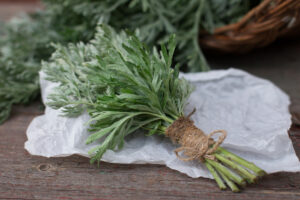Friends with Benefits: You & Mugwort
What is Mugwort?
Mugwort – also known as the dream herb, wormwood, chrysanthemum weed, St. John’s plant, and sailor’s tobacco – is a type of plant that’s native to certain areas of Asia and Africa, as well as most of Europe. Though not native to North America, it now grows there as well. Mugwort is a green, leafy plant that many people assume is a weed when it appears in their garden or yard.
The History of Mugwort
In ancient times, mugwort was used for medicinal purposes. Treatments often require the person to consume mugwort to ease issues with digestion, relieve discomfort in the stomach and uterus, and help assist with sleep.
Mugwort has also been a staple in many cultures’ culinary practices, especially in places where mugwort grew naturally. The leaves of mugwort give a slightly bitter taste to any recipe. The chopped-up leaves were often added to things like soups, stews, and rice dishes to give them a boost in flavor.
Mugwort also has a history of being used in rituals and cultural celebrations. Many people would use mugwort to promote lucid dreams and rich spiritual experiences. This is why mugwort has become known as “the dream herb.” Another ritualistic use for mugwort was in protection rituals.
What are the Benefits of Mugwort? 
Though not widely studied by scientists, many people attest to mugwort having a wide variety of health benefits.
Digestive Relief:
As previously mentioned, it was historically used for things like digestive relief. This is true today, mugwort having been found to alleviate issues like bloating, indigestion, and gas. It also acts as a stimulant for the digestive system to help things move along while easing discomfort.
Menstrual Relief:
For centuries, mugwort has been used to provide relief from discomfort during the menstrual cycle. It’s also considered able to regulate menstrual cycles due to the stimulating properties it contains.
Sleep & Dreams:
Mugwort has always been used as a sedative and is still often used as that today. Its properties help the body relax and release pent-up stress or anxiety. When consumed before bed, it’s found to not only help people fall asleep but also help them stay asleep better. While sleeping, many people believe that mugwort will also enhance their dreams. People report experiencing lucid dreams after the use of mugwort.
Healing & Overall Health:
Compounds have been found in mugwort that have anti-inflammatory and antioxidant properties. Whether consumed or applied topically, mugwort has been found to alleviate inflammation, relieve itching, and boost overall health when used regularly. Many cultures also use mugwort in a topical paste that they spread over wounds to promote healing and decrease infections.
The Best Ways to Enjoy Mugwort
Mugwort can be smoked, steeped in hot water, included in a meal, or used in a topical cream. It all just depends on what you’re hoping to gain from your use of it. For pain relief and health benefits, it’s usually best to smoke or drink mugwort. For wound healing, topical pastes are best. If you’d like to promote stress relief and better sleep, you can smoke mugwort, drink it, or even use it as an aromatherapy oil. For lucid dreaming, it’s traditional to smoke mugwort, but drinking it after steeping it in hot water also works.
However you choose to use mugwort, make sure to do so safely. If you are pregnant, take any medications, or have any allergies, you may want to consult a doctor before using it.


